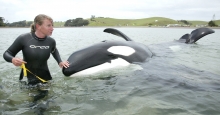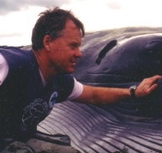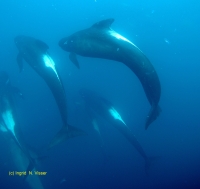This stranding event actually involved two strandings which were clearly linked to each other. The first, on Rangitoto Island caused much superficial damage to the individuals which may have triggered the second, onto a sandy calm beach.
An estimated 40 pilot whales were rescued from the rocky shores of Rangitoto Island and once back in the water they joined a group of approximately 80 others. However, by mid afternoon the whole group had restranded at Long Beach and its surrounding headlands. Crowd control was difficult given the close proximity to Auckland City and many volunteers were insistent that the whales be release immediately, resulting in chaos as whales who were unbalanced from their time ashore, had difficulty swimming and restranded on the reefs and subsequently getting badly injured on the rocks.
Eventually the whales were regrouped and held overnight. The next morning at approximately 0545 hours the whales were escorted out the Tiritiri Channel towards open sea, by Coastguard, Surf Club and Police boats.
Eighteen people were treated for hypothermia, with four taken to hospital, stressing the need for appropriate equipment and training.
To all those who came to help hold the whale overnight. It was a long cold one, but well worth the effort.
To all the boat drivers who helped to escort the whales out to sea.
Quick Facts
| Name | Pilot whale, long-finned |
| Image |
|
| Suborder | Odontoceti |
| Family | Delphinidae |
| Max. size - Male | 6.7 m (21.9 ft) |
| Max. size - Female | 5.7 m (18.7 ft) |
| Calf size | 1.7-1.8 m (5.5-5.9 ft) |
| Max. weight - Male | 2,300 kg |
| Max. weight - Female | 1,300 kg |
| Calf weight | 75 kg |
| Food | primary food is squid, but known to take fish |
| Latin name | Globicephala melas |
| Location |
Long Beach Auckland |
| Latitude |
-36.68482 |
| Longitude |
174.75066 |
| Number of Whales |
approximately 80 |
| Number rescued/saved |
74 |
At this rescue

Ingrid has attended numerous mass and individual strandings. She is experienced in sampling and data collection at these events, and in the use of refloatation Rescue Pontoons and other rescue equipment. She has served on the Board and was a trainer for another stranding rescue group.
Read more ››

From a background as the NZ Whale Rescue Coordinator and a Fisheries Officer, Steve went on to design and implement both the Marine Mammal Medic (MMM) course, including full procedure manuals and the Whale Rescue Refloatation Pontoon System in the 1980s. Originally designed to train DoC staff and authorities in effective whale rescue techniques, Steve later redeveloped the MMM course for the layperson.
Read more ››


